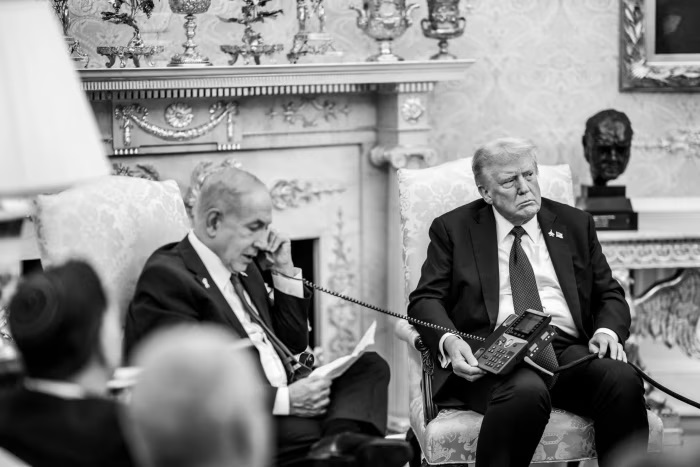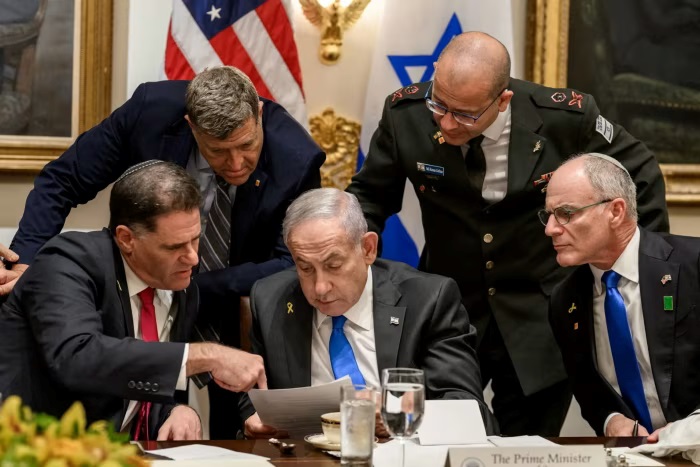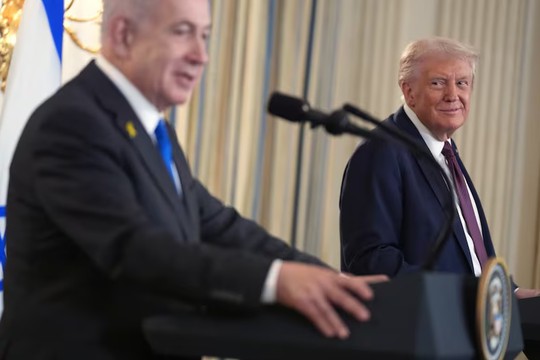Trump and Netanyahu press conference at the White House
Photo: AP
Israel’s prime minister has encountered the first US president he cannot easily outmanoeuvre, ‘Financial Times’ notes in a very interesting story about the events that took place in the White House.
Two weeks before he went to the US to negotiate a plan to end the war in Gaza, Prime Minister Benjamin Netanyahu stood in front of his far-right followers in an Israeli settlement in the occupied West Bank and made a vow.
“There will be no Palestinian state,” he said. “This place is ours.”
Now, sitting in a hotel room in New York with his closest advisers and US interlocutors, he was looking at a draft document for a Donald Trump-backed peace plan that ended with the exact opposite: a “credible pathway”, however vague, to a future Palestinian state.
“The sting was in the tail,” said a person briefed on the meeting. “It felt like a final betrayal.”
It wasn’t the only sting. Trump’s draft document was the result of a frantic round of lobbying by Qatar, Saudi Arabia and other influential Arab and Muslim countries, that also tapped into the president’s anger over Israel’s September 9 strike targeting Hamas’s political negotiators in Doha.
The diplomatic push was also aided by the renewed influence of Trump’s son-in-law and former Middle East envoy, Jared Kushner.
Their goal, said people involved in the process, was to deliver for the US president twin political and personal ambitions.
Trump wanted to secure the release of the 48 Israeli hostages held by Hamas, end the war in Gaza and also keep alive his dream of brokering a grand rapprochement between Israel and Saudi Arabia.
The timing was not arbitrary, said two Israeli officials involved in the talks.
Trump made clear that he wanted the war to end by the second anniversary of Hamas’s October 7 2023 attack on Israel, which triggered the conflict. The Nobel Peace Prize, which Trump covets, will also be announced this month.
“From very early on, Trump understood that the hostages are the keys that open all doors in the Middle East,” said a former Israeli diplomat who liaised with Washington on behalf of the captives’ families.
Trump had met with released hostages, knew some by name, and followed their recovery from months in captivity — a personal connection far surpassing that of Netanyahu. Trump’s envoy, Steve Witkoff, texts regularly with the families waiting for their loved ones.
But to get all the hostages out at once, and set his grand plan for the Middle East in motion, Trump needed Netanyahu to make concessions and a postwar plan.
This was necessary not just to convince Hamas — for whom the hostages are the only real source of leverage — but also to appease Washington’s Gulf allies, who Netanyahu had alienated with Israel’s belligerence across the Middle East.
Among the most influential was Qatar, which hosts Hamas’s political office and has been central to two years of mediation efforts, said people involved in the negotiations. Israel’s attack on Doha, a US ally, just as Hamas was studying a ceasefire proposal from Witkoff, infuriated Trump.
Indeed, when Netanyahu finally made it to the White House on September 29 — days after Trump had already presented his peace plan to Arab leaders — the president handed him a phone receiver and listened in as Netanyahu humbly apologised to Qatar’s prime minister.
The strike on Qatar “actually opened the door for all of this,” said a former US official who maintains contact with leaders in the Middle East.
The strike was humiliating for Trump, but “it allowed him to say, ‘you guys fucked up, and I’m bailing you out here, and I’m done,’” the official said, satirically characterising Netanyahu’s subsequent Oval Office apology to Qatar as “a hostage video”.
 At the White House, Trump handed Netanyahu a phone receiver and listened in as the Israeli prime minister humbly apologised to Qatar’s prime minister.
At the White House, Trump handed Netanyahu a phone receiver and listened in as the Israeli prime minister humbly apologised to Qatar’s prime minister.
Photo: The White House
While Netanyahu and his team tried watering down some elements of what became Trump’s 20-point peace plan — especially the reference to a Palestinian state — a Qatari technical team sat not far away in the White House, said a person familiar with the events.
“It was impossible to change more than a few words here and there,” said a second person who read drafts of the plan.
For instance, Netanyahu and his negotiators had sought one major concession — an opportunity to return to fighting if Israel decided Hamas had broken some clause of the agreement.
The team was told, in no uncertain terms, “to stop looking for loopholes”. Trump himself had guaranteed [to the Arabs] that Israel would not start the war again”, the person said. This pledge was verified by a second person familiar with conversations between the White House and Arab officials.
And so nestled between the dry legalese of the peace plan were proposals that would be anathema to the far-right and messianic parties that prop up Netanyahu’s coalition, and who have vowed to expel Palestinians from Gaza and resettle it with Jews.
Now, the document ruled out forced displacement and said Gazans would be free to leave the besieged enclave, and to return when they wanted. Hamas fighters could be granted amnesty if they gave up their weapons and agreed to “peaceful coexistence”, instead of being hunted to death.
Not only would Israel not be allowed to occupy or annex Gaza, it could not build settlements there. The UN, reviled by Netanyahu, would be allowed back to feed Palestinians starved by Israel’s blockade.
Still, there was enough in the document for Netanyahu to save face. Hamas would be barred from Palestinian governance. Its fighters would be disarmed and the strip demilitarised.
 The Israeli team was told, in no uncertain terms, ‘to stop looking for loopholes’ in the 20-point Trump peace plan.
The Israeli team was told, in no uncertain terms, ‘to stop looking for loopholes’ in the 20-point Trump peace plan.
Photo: The White House
A committee of Palestinian technocrats and an international supervisory body chaired by Trump would run Gaza temporarily, not the Palestinian Authority, which administers parts of the West Bank. An international force would provide security.
But most important, said two Israeli officials, was the language Trump used when announcing it — if Hamas rejected the deal, he said, “Israel would have my full backing to finish the job of destroying the threat of Hamas”.
Standing next to him, Netanyahu looked subdued. He had grappled with and outmanoeuvred three American presidents — Bill Clinton, Barack Obama and Joe Biden.
Now he faced intense pressure from the president he had confidently declared to be “the greatest friend that Israel has ever had in the White House”.
Though Trump has long unnerved US allies with his transactional approach to politics and mercurial decision-making, Netanyahu had seen the US leader and his fervently pro-Israel political base as reliable sources of support.
But earlier this year Trump surprised him with the announcement that the US had been holding indirect talks with Iran, then embarrassed him by reminding him that Israel was propped up by billions of dollars in US aid.
“The rule of thumb is Donald Trump’s interests come first,” said Michael Oren, a former Israeli ambassador to the US.
Before Trump, Netanyahu expanded settlements over Obama’s objections, and slow-rolled peace talks under Clinton. Referring to demands from Biden on the conduct of the Gaza war, Oren added: “And with president Biden who famously said don’t, don’t, don’t — and Israel did.”
“But with Donald Trump, when he says don’t, then you don’t,” said Oren. “And now that’s the rule [even for] Israel.”
He pointed out the expletive-laden public scolding the president administered when Israel bombed eastern Iran after Trump declared a ceasefire that ended a 12-day war between the regional enemies in June.
Days after his White House visit, where Netanyahu stood alongside Trump and said he supported the plan, the mood turned sour for the Israeli prime minister again.
Back home, he had sold the Trump proposals as a victory for Israel — a “take it or leave it” option for Hamas, with US blessing for Israel to annihilate the militant group as the cost of rejection.
But on Friday, when Hamas cherry-picked the part of the deal that appealed the most to Trump — the release within 72 hours of all the remaining captives, alive and dead — while sidestepping the more contentious elements, Netanyahu found himself cornered.
“Suddenly, there was a fundamental change in the situation. Earlier, Hamas had three choices — it could surrender, it could abjure terror, or it could die,” said Oren. “Now, it has a fourth choice — to negotiate. And while they negotiate, Israel has a red light.”
Shortly after Hamas’s statement, Trump ordered Israel to “immediately” cease military operations in Gaza while talks continued.
In a phone call with Trump, first reported by Axios and confirmed by an Israeli official, Netanyahu tried to convince Trump that Hamas’s qualified acceptance was a delaying tactic.
Trump snapped back: “Why are you so fucking negative?” Axios reported.
Days later, Trump publicly hammered the point home, telling an Israeli reporter that it did not take much to convince Netanyahu to accept the situation.
“He was fine with it. He’s got to be fine with it. He has no choice,” Trump told Israel’s Channel 12 news. “With me, you got to be fine.”
P.S.
The first day of resumed indirect talks between Israel and Hamas in Egypt ended on a positive note, amid hopes of a potential deal to implement United States President Donald Trump’s 20-point plan to end the war on Gaza, multiple sources told Al Jazeera and other media outlets, ‘Al Jazeera’ reports.
Negotiators are set to return for more discussions on Tuesday.
Sources told Al Jazeera Arabic that the meeting in the Red Sea resort city of Sharm el-Sheikh on Monday was “positive” and that a roadmap was drawn up for how the current round of talks would continue.
The Hamas delegation told mediators that Israel’s continued bombing of Gaza poses a challenge to negotiations on the release of captives, Al Jazeera Arabic reported.
The day-one talks covered the proposed exchange of prisoners and captives, a ceasefire, and humanitarian aid entering Gaza, according to Egypt’s state-linked Al-Qahera News.
White House press secretary Karoline Leavitt also said Trump was pushing for an early exchange of Israeli captives and Palestinian prisoners, in a bid to build “momentum” to implement other parts of his plan to end the Gaza war.
read more in our Telegram-channel https://t.me/The_International_Affairs

 11:17 08.10.2025 •
11:17 08.10.2025 •























